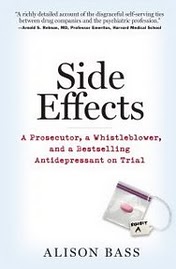It's true that the drug industry was hard hit last year with some
pretty hefty fines for the illegal off-label promotion of drugs -- $1.4
billion against Eli Lilly for its off-label promotion of Zyprexa and
$2.3 billion against Pfizer for doing the same with several drugs. But
such fines, many say, are still considered the cost of doing business
in an industry that raked in close to $300 billion in U.S. drug sales
in 2008 (and more in 2009), according to IMS Health Reports.
Now, Alaska attorney Jim Gottstein has
proposed a different and potentially more effective approach toward
curbing the systemic over-drugging of economically disadvantaged
youngsters in this country, a sad reality which I've written about here and here.
According to one recent study, children covered by Medicaid are given
anti-psychotics such as Zyprexa and Seroquel (which have serious side
effects) four times as often as children whose parents have private
insurance. These drugs are often prescribed as chemical straitjackets
to control children whose parents or foster families are unable to give
them the attention and parenting they need. That was certainly the case
for four-year-old Rebecca Riley, who died from an overdose of
psychoactive drugs prescribed by a psychiatrist at Tufts Medical
Center, Kayoko Kifuji.
Gottstein
has launched an initiative to sue doctors like Kifuji who blithely
prescribe potent drugs that are not approved for use in children. These
lawsuits, filed under a federal Qui Tam complaint, would target not
only the individual doctors but the hospitals and clinics that employ
them and the pharmacies that fill their prescriptions and submit them
to Medicaid for reimbursement. It is Gottstein's contention that these
prescriptions constitute Medicaid fraud since they are written for uses
that are not medically accepted (i.e. off-label). There is legal
precedent for this kind of argument. Indeed, the Department of Justice's news release
announcing its $2.3 billion settlement with Pfizer says that the drug
giant caused false claims to be submitted to government health care
programs for uses that were not medically accepted indications. So if
the feds can succeed with this kind of argument, why not individual
claimants?
Gottstein is planning to discuss his medicaid fraud initiative in a lecture webinar on Feb. 24, sponsored by the International Center for the Study of Psychiatry and Psychology. So if you know of a disadvantaged child who was slapped on drugs he or she didn't need, you might want to listen in.
Monday, February 8, 2010
Subscribe to:
Post Comments (Atom)



4 comments:
Alison, I read your post and the Boston Globe link about this tragic circumstance. Of course, ideally everyone should receive a drug for the right reason. Respectfully, the Globe piece, and your post, do not offer a balanced view of what occurred and the relevant facts (which are probably not known at present). Before I conclude that physician or hospital was negligent and reckless - as the article suggests - I would want to know the facts. Articles like this understandably affect readers. If those who are presented as 'guilty' are ultimately exonerated, then the damage has already been done. We physicians are sensitive to the unfairness of making flimsy allegations after an adverse event or tragedy has occurred. www.MDWhistleblower.blogspot.com
Alison
How is a False Claims Act action against Eli Lilly precedent for FCA actions against individual physicians?
Marilyn
As I understand it, Pfizer settled under the False Claims Act for promoting Geodon and other drugs in children for non-medically accepted indications. So the idea behind these lawsuits against individual physicians is that if they knowingly prescribed drugs in children for non medically accepted indications (i.e. indications not approved by the FDA), then they are liable under the False Claims Act. The courts, of course, will decide the merits of this argument.
Yes Alison, you are exactly right. Any MD and employer to engages in prescribing a medicine to a child, whereby that drug is not FDA approved AND the bill is being paid for by Medicaid, has committed fraud/a crime. Any individual can sue on behalf of the government, in an attempt to recapture the financial loss. This may help promote Evidence Based Practices and slow down the massive drugging of children and promotion by drug companies. $20-$29...this is a must attend webinar. http://eventcallregistration.com/reg/index.jsp?cid=13441t11
Dr. Toby Watson, PsyD, www.abcmedsfree.com
Post a Comment